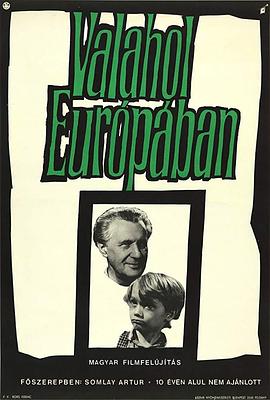WJ
ZD线路
 剧情简介
剧情简介
Somewhere in the remote region, the war ends. In the midst of ruined cities and houses in the streets, in rural hamlets, everywhere where people still live, are children who have lost their homes and parents. Abandoned, hungry, and in rags, defenseless and humiliated, they wander through the world. Hunger drives them. Little streams of orphans merge into a river which rushes forward and submerges everything in its path. The children do not know any feeling; they know only the world of their enemies. They fight, steal, struggle for a mouthful of food, and violence is merely a means to get it. A gang led by Cahoun finds a refuge in an abandoned castle and encounters an old composer who has voluntarily retired into solitude from a world of hatred, treason, and crime. How can they find a common ground, how can they become mutual friends The castle becomes their hiding place but possibly it will also be their first home which they may organize and must defend. But even for this, the price will be very high. To this simple story, the journalist, writer, poet, scriptwriter, movie director, and film theoretician Béla Balázs applied many years of experience. He and the director Géza Radványi created a work which opened a new postwar chapter in Hungarian film. Surprisingly, this film has not lost any of its impact over the years, especially on a profound philosophical level. That is to say, it is not merely a movie about war; it is not important in what location and in what period of time it takes place. It is a story outside of time about the joyless fate of children who pay dearly for the cruel war games of adults. At the time it was premiered, the movie was enthusiastically received by the critics. The main roles were taken by streetwise boys of a children's group who created their roles improvisationally in close contact with a few professional actors, and in the children's acting their own fresh experience of war's turmoil appears to be reflected. At the same time, their performance fits admirably into the mosaic of a very complex movie language. Balázs's influence revealed itself, above all, in the introductory sequences an air raid on an amusement park, seen in a montage of dramatic situations evoking the last spasms of war, where, undoubtedly, we discern the influence of classical Soviet cinematography. Shooting, the boy's escape, the locomotive's wheels, the shadows of soldiers with submachine guns, the sound of a whistle—the images are linked together in abrupt sequences in which varying shots and expressive sharp sounds are emphasized. A perfectly planned screenplay avoided all elements of sentimentality, time-worn stereotypes of wronged children, romanticism and cheap simplification. The authors succeeded in bridging the perilous dramatic abyss of the metamorphosis of a children's community. Their telling of the story (the scene of pillaging, the assault on the castle, etc) independently introduced some neorealist elements which, at that time, were being propagated in Italy by De Sica, Rossellini, and other film artists. The rebukes of contemporary critics, who called attention to formalism for its own sake have been forgotten. The masterly art of cameraman Barnabás Hegyi gives vitality to the poetic images. His angle shots of the children, his composition of scenes in the castle interior, are a living document of the times, and underline the atmosphere and the characters of the protagonists. The success of the picture was also enhanced by the musical art of composer Dénes Buday who, in tense situations, inserted the theme of the Marseilaise into the movie's structure, as a motive of community unification, as an expression of friendship and the possibility of understanding. Valahol Europaban is the first significant postwar Hungarian film. It originated in a relaxed atmosphere, replete with joy and euphoria, and it includes these elements in order to demonstrate the strength of humanism, tolerance, and friendship. It represents a general condemnation of war anywhere in the world, in any form.
1948年上映,由Artúr,Somlay,Miklós,Gábor,Zsuzsa,Bánki等主演的《欧洲的某个地方》在其它发行,《欧洲的某个地方》高清BD1280下载,欧洲的某个地方HD1280/1080p/百度云720P/BD1080P/免费高清版/在线观看。
如果你喜欢欧洲的某个地方,欢迎分享给你的好友,本片只做交流学习,请勿用于商业利益行为,请支持欧洲的某个地方正版影片!,请下载观看后24小时内删除,感谢支持!
1948年上映,由Artúr,Somlay,Miklós,Gábor,Zsuzsa,Bánki等主演的《欧洲的某个地方》在其它发行,《欧洲的某个地方》高清BD1280下载,欧洲的某个地方HD1280/1080p/百度云720P/BD1080P/免费高清版/在线观看。
如果你喜欢欧洲的某个地方,欢迎分享给你的好友,本片只做交流学习,请勿用于商业利益行为,请支持欧洲的某个地方正版影片!,请下载观看后24小时内删除,感谢支持!
 相关问答
相关问答
1、问:《欧洲的某个地方》什么时候上映时间?
答:🦄这部影片的上映时间是1948
2、问:🐥《欧洲的某个地方》电影在哪个电视台播出?
答:《欧洲的某个地方》目前只有网上如腾讯、爱奇艺、乐图影院、优酷等播出,没有在电视台播。
3、问:🦄 电影《欧洲的某个地方》演员表
答:欧洲的某个地方是由Radványi,Géza执导,Artúr,Somlay,Miklós,Gábor,Zsuzsa,Bánki领衔主演的 剧情片 。
4、问:手机版免费在线点播🐴《欧洲的某个地方》有哪些网站?
答:hao123影视、百度视频、手机版乐图影院、PPTV、电影天堂
5、问:《欧洲的某个地方》评价怎么样?
Mtime时光网网友评价:太好看了。把自己的爱心封闭起来,就算你能建造出再美丽的城堡,你也是生活在孤独与绝望之中。敞开爱心城堡的大门,与所有人分享,容纳所有的人,让周围的人都能感受到你的爱,那么世界就会变得美丽人动人。
丢豆网网友评论:Radványi,Géza导演的作品,有欢笑、有泪水、有喜悦、有悲伤...,虚在自己的善良本性下得到了很多友谊,而且还收货了爱情。片子没有配音才是完美的,因为每个人的感悟都不同
豆瓣电影网友:《欧洲的某个地方》那个场景真的很感人,就像每个人心底都有那么一段回忆,抓不住,却又那么唯美,后来它自己带着爱人及孩子在第二年春天,在那个画面中飞翔,整个画面播放了"虫"一生的意义是有挫折,有经历它才变得有故事,有勇气,有朋友,并和爱人孩子一起幸福生活!它是不是像极了自己心灵中的某个故事? 没有人类语言的场景,反而更让我们感受到了纯粹大自然感觉,没有语言告白,也许不同的你看完了有着不同的感受
